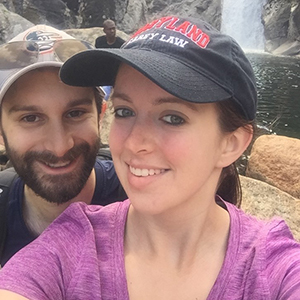This past summer, Environmental Law Students Emily Schenning and Suhani Chitalia had the incredible opportunity to collaborate with the University of Malawi's Environmental Sustainability Law Clinic. The two students traveled to Malawi and stayed for a total of 8 weeks. While they were there, they worked along side Malawi University students and professors on a variety of issues ranging from wildlife regulation to drinking water. Below, they've shared their experiences with us.
Emily Schenning:
"This summer I had the privilege of traveling to Malawi to work with the University of Malawi’s Environmental and Sustainability Clinic. After arriving in Malawi, we were greeted by Professor Chikosa Banda and clinic students. We attended lectures and an orientation describing relevant environmental laws in Malawi and governmental structure. We met with LEAD (an organization working to combat climate change issues in Lake Chilwa among other projects). We also met with CEPA (the Center for Environmental Policy and Advocacy) and worked with them on their new fisheries bill providing insight and comments.
We spent much time traveling through the country with the environmental law clinic spotting issues and discussing them with the clinic students and faculty. During our travels, we went to Lake Chilwa, a small lake mainly used as a source of fishing for people in the Zomba region. We talked to local fishers who were being severely affected by the current fisheries law banning all fishing in the lake. Finally, while in Malawi, I was also able to conduct my own research on wildlife laws in Malawi and surrounding nations; culminating in a final research paper that is being published with Villanova’s Environmental Law Journal."
Suhani Chitalia:
"This summer I was fortunate enough to travel to Zomba, Malawi for 8 weeks and work with the University of Malawi, Chancellor College Faculty of Law. While there, I worked alongside students who were part of the Environmental Justice and Sustainability Clinic. While in Zomba, the clinic organized a number of site visits to national parks including Liwonde, Majete, Mulanje, Lake Chilwa and Lake Malawi. Each location had a unique set of environmental challenges ranging from wildlife regulation to clean drinking water. Lake Chilwa was one of the more striking visits to me as it exemplified the challenges involved with an economy entirely reliant on fishing. As over-fishing plagued Lake Chilwa, the areas surrounding the lake were abandoned and families were left with little to no source of income.
Following our initial site visits and meeting with local organizations such as the Leadership for Environment and Development (LEAD) and the Centre for Environmental Policy and Advocacy (CEPA), I decided to focus my efforts on agriculture law in Malawi. The clinic students and non-profit organizations emphasized the importance of a new seed policy being drafted in Malawi. The issue with this policy is that it only recognized “formal seeds” which are developed through large scale commercial seed manufacturers and essentially disregarded “informal seeds” which were generally produced by local Malawian farmers. The new policy would push out local farmers from the agricultural economy in Malawi and give rise to a commercialized seed market. With the help of the clinic students, I am now writing a paper on legal remedies and options for local farmers in light of the new seed policy.
Being exposed to the law and legal field in Malawi was an enlightening experience. Students in the clinic were incredibly passionate, hardworking and warm. I look forward to seeing what future collaborations will come between the University of Maryland and the University of Malawi Chancellor College and am incredibly thankful for my time in the warm heart of Africa.”

